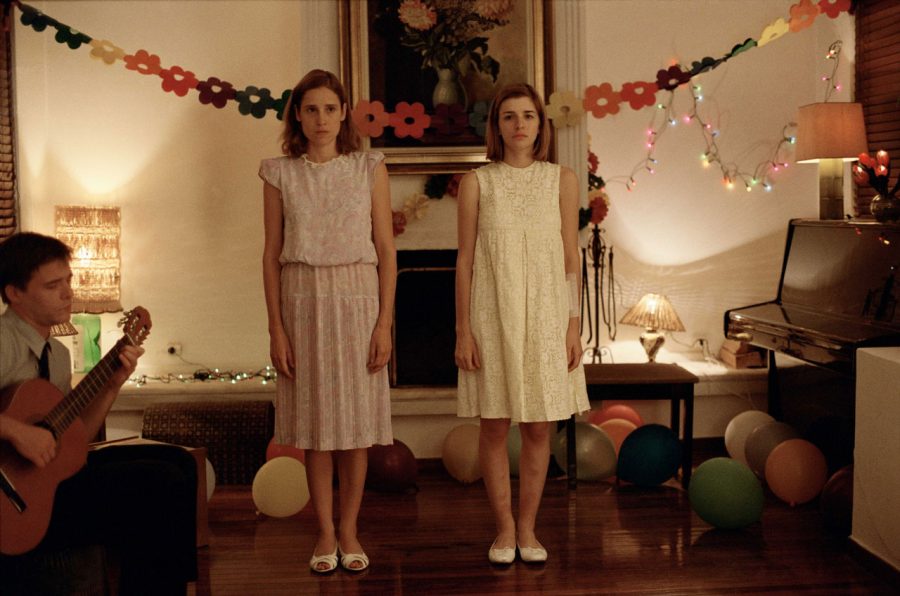‘Dogtooth’ (Greece, 2009) is a strangely sharp piece of experimental cinema
The Greek movie “Dogtooth,” directed by Yorgos Lanthimos, is pictured above. “Dogtooth” was released on November 11, 2009.
May 27, 2021
There’s a peculiar quality about the films of Greek writer/director Yorgos Lanthimos. It’s quite easy to describe them in one word. When you try to get closer to the heart of the film, however, it becomes more difficult to put words on the page. You get lost in the surrealism, the abstract, the movement and the meaning of it all.
The one word that easily and accurately summarizes Lanthimos’ filmography: weird.
The 2009 film “Dogtooth” is Lanthimos’s second feature film, but he was no stranger to the Greek creative scene. He’d been floating around the Greek theater circuit since the mid-1990s and was part of the creative team who designed the opening and closing ceremonies of the 2004 Olympics in Athens. However, “Dogtooth” garnered Lanthimos his first major bout of international attention, earning a best international feature film nomination at the 2010 Academy Awards.
Lanthimos would later go on to greater success with his English-language films, writing and directing 2015’s “The Lobster,” which earned him a nomination for best original screenplay, as well as 2018’s “The Favorite,” by far his most critically acclaimed work, earning ten Academy Award nominations — including best picture, best director and even best actress win for the leading Olivia Colman. But it all started with the low-budget, obtuse and baffling “Dogtooth.”
“Dogtooth” is about a family who lives on a beautiful property with a large wall around the estate. The husband and wife keep their three adult children ignorant of the outside world and lead them to believe they have a brother on the other side of the wall. The children play endurance games to keep each other entertained, take orders from their parents and attempt to protect each other from a beast (a house cat) prowling their property.
Get The Daily Illini in your inbox!
The only outside contact the children have is with a prostitute named Christina (curiously the only named character in the film) their dad hires for his son. We see the father and mother teach new vocabulary to their children but with intentionally different definitions. “Zombie” means a small yellow flower, “sea” means an armchair and a “cat” is the most dangerous animal out there that the property must be protected from. The signified has a different signifier.
If the plot description isn’t weird enough, Lanthimos’ stage experience comes into use with deliberate and unsettling framing and blocking choices. At times, the characters’ heads are sliced off by the camera’s frame of view, and the climax of the film is a deeply unnerving dance sequence. Lanthimos understands the importance of movement as a storytelling device, using it as a type of silent dialogue between the characters.
It’s easy to see this all as a metaphor for authoritarianism. The parents control the language, and if you can control the language, you can control the people. Information is only filtered through the parents, and any outside media — in this film’s case, two VHS tapes given to one of the children by Christina — is immediately destroyed and used for violence.
When Lanthimos wrote the film during the midst of the 2007-2008 global financial crisis, Greece was on the precipice of its own government debt crisis. As with most economic crises, social and political strife weren’t far behind.
In the wake of the government debt crisis, Greece’s press freedom sharply eroded, moving from 35th to 99th place in Reports Without Borders Press Freedom Index. The neo-Nazi Golden Dawn party earned a 7% share of the vote following the crisis and became the third-largest political party in the Greek Parliament. And while Greece’s parliamentary representative democratic republic government is similar to most Western Democracies, mandatory conscription and state protection of the Greek Orthodox Church is constant, pre-crisis societal factors that lean toward the authoritarian.
Maybe Lanthimos could see the writing on the wall, crafting an unsettling and poignant warning sign. Or maybe he just wanted to make a weird movie. It’s hard to tell. Virtually no two people will leave the theater thinking the same thing, perhaps other than “that was weird.” David Lynch called it a “fantastic comedy,” which makes sense considering Lynch’s own filmography. What I saw was anything but a comedy, but, then again, I’m no David Lynch and to each their own. But to me, what Lanthimos achieved with “Dogtooth” is a bleak, unnerving memorable family drama.
I may not have loved “Dogtooth,” but it has not left my mind since watching it. It’s a blank slate for the viewer to parse, pick apart and interpret. And while it certainly is not for everyone, it no doubt launched the career of perhaps the most original director in cinema today.






